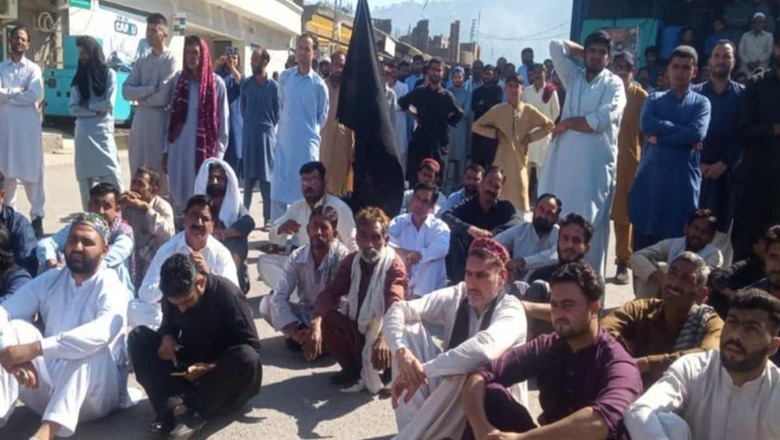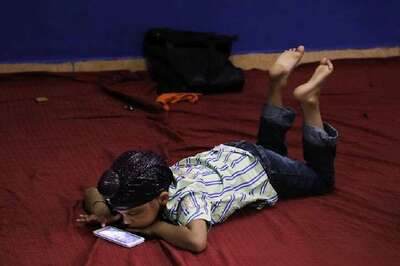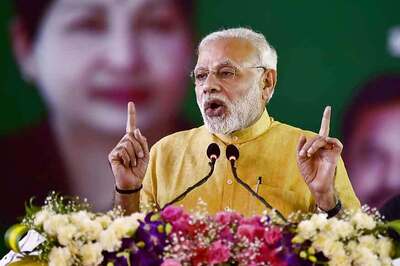
views
Pakistan and India champion conflicting ideologies. The creation of Pakistan was based on the communal concept based on religion that Muslims and Hindus are two separate entities that cannot co-exist.
It was formulated by Muhammad Ali Jinnah and eventually led to the break up of Bharat in August 1947.
Political forces of a different kind on the other hand liberated Bharat. The Congress party that collectively led British India to its independence was predominantly influenced by the ideology of the left.
The division of Pakistan and Bharat into a theocratic and a secular state continues to exist to this day. The projection of Pakistan from a liberal theocratic state towards a hard-line jihadi state and Bharat’s from a nationalised (socialist) state towards becoming a privatised liberal economy are but just examples of how nation states progressed under the aforementioned cultural dictates.
The long list of grievances between the two neighbouring countries has created deep-rooted mistrust of each other. Only implementing vigorous diplomacy, reopening of trade routes and people-to-people cultural exchanges as a first step towards kick-starting a renewed phase of re-engagement could possibly lead to lasting peace between Bharat and Pakistan.
For this to happen Pakistan must appreciate Bharat’s traditional sphere of influence in the region and beyond. It must also realise that the mistrust between the two countries comes from the hostility fuelled by Pakistan through past acts of aggression (1947, 1965, 1971 and 1999) as well as due to attempts to stir unrest in the Union Territory of Jammu and Kashmir by sending jihadi proxy terrorists from across the Line of Control (LoC).
Pakistan has a few choices when it comes to relations with Bharat. They all are related to the willingness or otherwise of the bilateral dispute between the two over the former state of Jammu and Kashmir.
First is war. In case of war, the devastation in the region will be beyond anybody’s expectation before Pakistan is beaten into total submission.
If, and that is a big if, Pakistan becomes willing to take the less disastrous route, then it must demonstrate its readiness to engage with Bharat in initiating a cooling-off period.
This readiness should be demonstrated by Pakistan with the opening up of crossing points that remain closed since August 2019. Secondly, Pakistan must withdraw all jihadi terrorists from its launch pads in Pakistan-occupied Jammu and Kashmir. And, thirdly, Pakistan has to ensure that it has a stable political system.
At present, Pakistan is preparing for the next general election due in January 2024. Many are of the view that 2024 will bring former Pakistan prime minister Nawaz Sharif back into power for a fourth time.
Sharif is keen to establish peaceful relations with Bharat and negotiate trade deals. However, whether the Pakistan military generals will accept normalisation of relations with Bharat is another matter.
A sustainable resolution to the longest territorial conflict in our history demands that Pakistan has a stable and sustainable government.
To normalise relations with Bharat, Pakistan needs to re-evaluate its relations with China and the role it is expected to play in China’s Belt and Road Initiative. It will have to de-link itself from CPEC and consider joining the India-Middle East Economic Corridor, connecting the port of Gwadar with the ports in Gujarat and Mumbai.
The normalisation of relations between Bharat and Pakistan also depends on the resolution of the false cultural antagonism it has encouraged over the past 77 years based on the two-nation theory.
Pakistan will have to declare that Hindu is not the enemy of the Muslim and that it rejects the two-nation theory of Muhammad Ali Jinnah in its totality. This does not mean Pakistan has to return its territory back to Bharat. All it means is that Pakistan needs a tectonic ideological shift that is in tune with today’s neo-liberal world order.
This will result in the government of Pakistan saving billions of dollars in arms spending and maintaining an army that is led by corrupt generals. Cheap goods influx into Pakistan will help the economy grow again.
Bharat can also solve the electricity crisis in Pakistan by supplying power at affordable rates and Pakistan can focus on the development of its manufacturing sector for earning foreign exchange as well as developing its tourism industry to bring in even more foreign exchange into the country.
The question is how willing is Pakistan’s ruling establishment to abandon anti-Hindu religious nationalism and how strong are the social, political and cultural forces in Pakistan and PoJK to instruct a revolution that would deem the military powerless? Realistically speaking, at the moment neither seems to be the case, but then in times of turmoil and revolution the consciousness of the people marches forward in leaps.
The Pakistan military is rigorously consolidating its power and most importantly its reputation after the events of May 9 in which public fury following the arrest of the former Prime Minister Imran Khan resulted in violent attacks on military installations in both Punjab and the province of KPK.
As for the population, they have not come up, yet, with a political and cultural narrative to decisively challenge the two-nation theory and the role of military in the affairs of the state. Therefore, we must look elsewhere.
On October 5, PoJK observed a general strike in the occupied state. It was the second general strike in a month. On October 10, women and children from all over PoJK came out in protest. And on October 17, students from across the occupied territory braved heavy rain to take out protest marches against Pakistan and demanded independence and control of their natural resources.
The only thing that in my view can now bring about a resolution to the Kashmir dispute is if from inside PoJK an angry public turns its anger into a full-scale rebellion against Pakistan’s occupation of PoJK.
However, unless the Jammu Kashmir Joint Awami Action Committee (JKJAAC), which is leading the civil disobedience movement in PoJK, realises that it is a government-in-waiting, and calls for the resignation and the termination of the PoJK assembly and seat of power in Muzaffarabad and takes power into its own hands, I do not see a resolution to the Kashmir dispute in the foreseeable future.
The coming into power of the JKJAAC with the demand that Pakistan withdraw its troops from PoJK will lead to the formation of a new government that could then sign a defence pact with the Republic of Bharat and give itself a lease of life and more importantly enough time to enter into a negotiated settlement with the Delhi Sarkar, leading to the reunification of the state of Jammu and Kashmir.
It is for this reason that I have always put the main emphasis of our liberation struggle on winning the narrative war first. And that cannot even begin without first and foremost the unequivocal condemnation of the two-nation theory of Muhammad Ali Jinnah that led to the partition of British India in the first place.
Dr Amjad Ayub Mirza is an author, broadcaster and human rights activist from Mirpur in PoJK. He lives in the UK. Views expressed in the above piece are personal and solely that of the author. They do not necessarily reflect News18’s views.




















Comments
0 comment